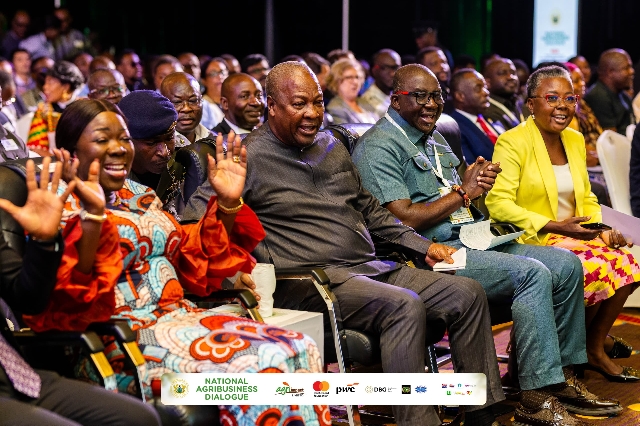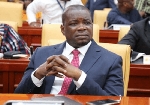Ghana must intentionally build indigenous agribusiness icons - Agri-Impact CEO
 President Mahama seated with participants
President Mahama seated with participants
Ghana must intentionally develop indigenous agribusiness champions to drive industrialisation, create jobs, and position the country on the global trade map, Dan Fahene Acquaye, CEO of Agri-Impact Group, has said.
Speaking at the National Agribusiness Dialogue held at the Kempinski Hotel, Gold City, Accra on Monday, July 28, 2025, Mr. Acquaye urged stakeholders to pursue smart policies, strategic partnerships, and export-driven incentives to nurture local firms into billion-dollar Unicorns.
"It is not easy to count more than 15 large-scale indigenous agro-processing firms in the country. Agribusiness firms are saddled with legacy debts largely due to a lack of specialised financing products for actors,” Mr. Acquaye said.
He called for the Ministry of Trade, Agribusiness and Industry to champion this agenda, ensuring agribusiness is not only local in operation but global in vision.
"These champions will not emerge by chance.
They must be intentionally built through smart policies, targeted incentives and strategic partnerships. With a strong export orientation, they can brand Ghanaian quality, increase access to global and regional markets and fully integrate our producers into global value chains.
Agribusiness may be local in operation, but must be global in our vision," the agribusiness mogul noted.
Dan Fahene Acquaye also decried Ghana’s staggering $2 billion in post-harvest losses annually, calling it a missed economic opportunity.
He urged government and stakeholders to establish a dedicated Agri-Fund to finance critical agro-processing infrastructure and blended financing solutions.
"A fund that will be a game-changer; de-risking investments, unlocking capital, and empowering industry actors to scale with confidence and resilience and reset the staggering $2 billion post-harvest losses into agribusiness gains."
"Agribusiness, which is the demand side of skilled labour, churning out young entrepreneurs, must receive equal financial attention as Education, which is the supply side of skilled labour," he added.
Speaking at the National Agribusiness Dialogue in Accra, the Minister of Trade, Agribusiness and Industry, Hon. Elizabeth Ofosu-Adjare, emphasised that the expanded government mandate to include agribusiness reflects a pivotal shift in the country’s economic strategy, one that aligns with President Mahama’s vision to position Ghana as a regional leader in agribusiness.
“We must move beyond traditional approaches.
This policy must be inclusive, forward-looking, and aligned with our economic transformation goals,” the Minister said, noting the need to address key challenges such as access to finance, value addition, market systems, and agri-tech adoption.
President John Dramani Mahama, who officially opened the Dialogue, said agribusiness is a critical engine for Ghana’s industrial transformation and pledged his government’s commitment to bold reforms that will unlock the sector’s full potential.
Delivering the keynote address, President Mahama described agribusiness as his personal passion, emphasising its capacity to drive inclusive growth, create jobs, and position Ghana competitively in the global agricultural value chain.
This is not just a stakeholder meeting; it is a vital turning point in our journey to move Ghana from an agrarian economy to an industrial, export-oriented one, the President stated.
He highlighted key initiatives, including the Feed the Industries Programme, 24-Hour Economy Policy, and the Rapid Industrialisation Initiative, designed to ensure year-round raw material supply, boost processing capacity, and integrate farmers into formal markets.
To support this, President Mahama announced ongoing and new irrigation projects, a plan to waive import duties on agro-processing machinery, and a medium-term strategy to retool local fabrication of agri-machinery through the GRATIS Foundation.
The National Agribusiness Dialogue is geared towards formulating a policy for Ghana’s agribusiness sector.
It was organised by the Ministry of Trade, Agribusiness and Industry in partnership with Agri-Impact Limited, Mastercard Foundation, PwC, DBG, FAGE and the Chamber of Agribusiness Ghana.
Source: Classfmonline.com/Cecil Mensah
Trending News

Prof. Kester Quist-Aphetsi champions AI adoption at inaugural DUC media AI confab
09:25
Kennedy Agyapong declares intent to contest NPP presidential primaries for 2028
04:07
Adentan Circuit Court remands 2 in defilement case involving 14-year-old girl, 6 others at large
17:23
COA Research denies claims COA-72 is undergoing HIV clinical trials
09:20
Dr. Zanetor Agyemang-Rawlings sworn in as member of Pan-African Parliament
09:10
Big push for nat'l infrastructure: Parliament approves massive road dev't programme with key routes under construction
01:00
Minority bemoans challenges faced by businesses on account of Dollar shortages
13:32
Two Nalerigu SHS students shot dead on campus
09:08
Ghana, China mark 98th anniversary of People’s Liberation Army with renewed commitment to bilateral cooperation
08:51
GA/R: GAF investigates 'inappropriate conduct' against journalist, civilian by soldiers at Spintex
00:55




